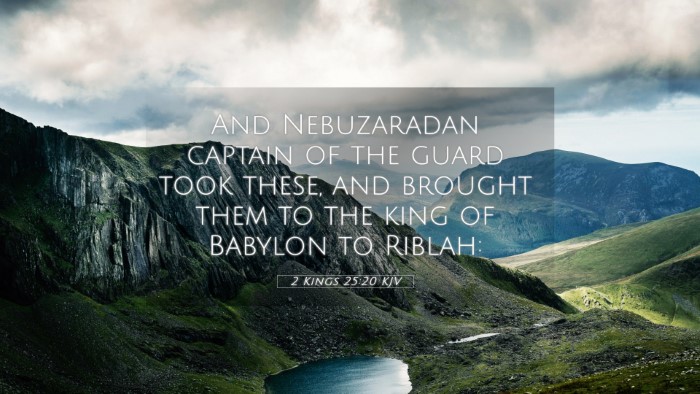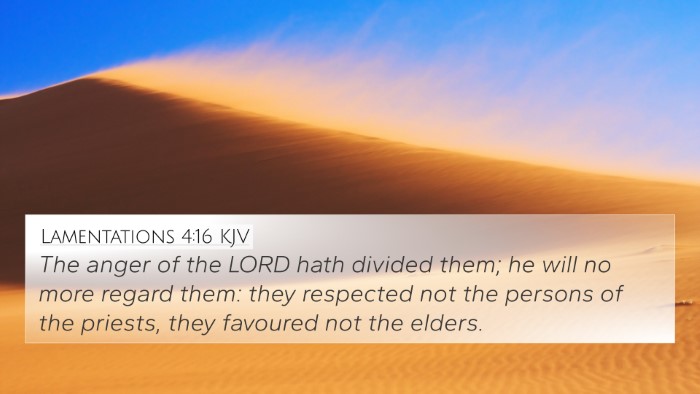Understanding 2 Kings 25:20
2 Kings 25:20 states:
“And Nebuzaradan the captain of the guard took into captivity the rest of the people that remained in the city, and those that fell away, that fell to the king of Babylon, and the rest of the multitude.”
Overview of the Verse
This verse depicts the final stages of the Babylonian siege of Jerusalem. Nebuzaradan, the captain of the Babylonian guard, is portrayed executing the orders of King Nebuchadnezzar. It serves as an account of the total exile of the remaining people after Jerusalem falls, including those who had surrendered to the Babylonians.
Commentary Insights
-
Matthew Henry:
Henry emphasizes the severity of divine judgment upon Jerusalem due to the idolatry and rebellion of the people. In this verse, the captain of the guard embodies the inevitable consequence of unfaithfulness to God, and it illustrates the complete disbandment of the people of Jerusalem.
-
Albert Barnes:
Barnes highlights the significance of the phrase "the rest of the people" indicating the remnant that remained in Jerusalem. He notes the capture of those who had not yet been taken away or had chosen to defect, illustrating the total submission of the Jewish people to Babylonian rule.
-
Adam Clarke:
Clarke provides a historical context, explaining the dire circumstances that led to this mass captivity. He outlines the futility of resistance against the Babylonian forces and how this verse marks the end of an era for the Jewish nation, pointing towards the hopelessness that followed their disobedience to God's commandments.
Cross-References
This verse parallels numerous other scriptures that discuss the themes of captivity, judgment, and the consequences of disobedience. Notable cross-references include:
- Jeremiah 39:6-7: This passage describes the capture of Jerusalem and the fate of its inhabitants, echoing the themes of destruction and exile found in 2 Kings 25:20.
- 2 Chronicles 36:17-20: Chronicles provides an account of the Babylonian conquest and the destruction of the temple, reinforcing the consequences faced by the people.
- Ezekiel 33:21-22: In this scripture, the prophetic voice speaks about the fall of Jerusalem, linking the judgment of God with the captivity emphasized in Kings.
- Isaiah 39:6-7: Isaiah prophesies about the future captivity of Judah, which connects the prophetic warnings with the realization of these events in Kings.
- Lamentations 1:3: This verse articulates the sorrow and desolation following the destruction of Jerusalem, complementing the historical account in 2 Kings.
- Daniel 1:1-2: Daniel's account also pertains to the Babylonian exile, focusing on the intellectual captives, showing the wider implications of Jerusalem's fall.
- Jeremiah 52:24-30: This passage further details the exile of those left in Jerusalem, providing additional clarity and context to the events described in 2 Kings 25.
Thematic Connections
2 Kings 25:20 is pivotal in understanding the broader themes found in the Old Testament, such as:
- Judgment: Many scripture passages illustrate that corporate disobedience leads to judgment (Deuteronomy 28).
- Hope After Judgment: Many books, especially the Prophets, provide promises of restoration after judgment (Jeremiah 30:3).
- Exile and Return: The exile marks a significant theme across both Testaments (Ezekiel 37:21-22).
- God as Sovereign: The sovereignty of God is affirmed in the face of human disobedience throughout the scriptures (Isaiah 45:7).
Conclusion
In summary, 2 Kings 25:20 is a solemn declaration of the consequences that followed a long history of disobedience from the people of Jerusalem. The insights from traditional commentaries bring to light the gravity of the events that unfolded and the numerous connections between this verse and others in the Bible, emphasizing the importance of obedience to God and the inevitable outcomes of turning away from Him.
Using Cross-References in Study
For those embarking on a deeper study of the Bible, utilizing tools for cross-referencing allows one to:
- Trace themes and motifs throughout scripture.
- Understand the interconnectedness of biblical texts.
- Enhance sermon preparation by identifying supportive verses.
- Engage in a comparative analysis of related passages.
Overall, the study of cross-references not only deepens one’s understanding of individual verses but enriches the entire biblical narrative.





